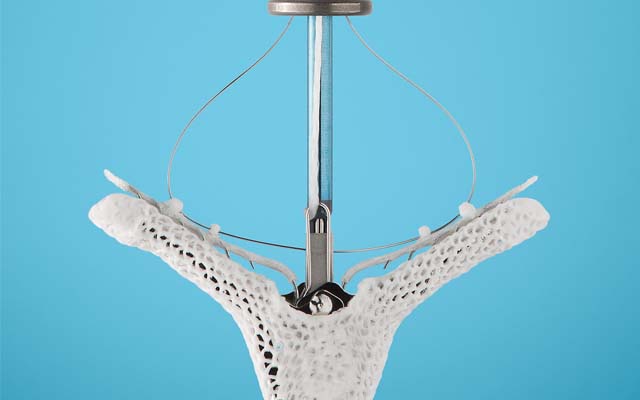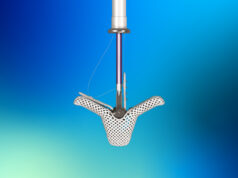
The US FDA has approved a new indication for percutaneous edge-to-edge repair (MitraClip, Abbott), allowing its use for the reduction of moderate-to-severe or severe secondary mitral regurgitation in patients who are already receiving optimal medical therapy. When first approved in 2013, the MitraClip was indicated to reduce mitral regurgitation in certain patients with degenerative mitral regurgitation.
The MitraClip is inserted in a minimally invasive procedure through the femoral vein in the leg and guided into the heart’s left ventricle where it grasps the two leaflets of the mitral valve, clipping them together to reduce the backflow of blood.
Bram D Zuckerman (Division of Cardiovascular Devices, the Center for Devices and Radiological Health), says: “Expanding the approval of this device to heart failure patients with significant secondary mitral regurgitation, who have failed to get symptom relief from other therapies, provides an important new treatment option. Careful evaluation by a team of specialists is essential to determining whether a particular patient is an appropriate candidate for this procedure.”
The approval of the new indication is based on a study of 614 patients with heart failure who had moderate-to-severe or severe secondary mitral regurgitation and were randomly assigned to get either continuation of their optimised medication treatment plus the MitraClip (MitraClip group) or continuation of their optimised medication treatment only (control group). The risk of being re-hospitalised for heart failure symptoms was reduced by approximately 47% in the MitraClip group compared to the control group. Additionally, the risk of death within two years was decreased by approximately 37% in the MitraClip group compared to the control group.
About 6.5 million American adults live with heart failure, a chronic, progressive condition in which the heart muscle is unable to pump enough blood to meet the body’s needs for blood and oxygen. A small percentage of these patients also have moderate-to-severe or severe secondary mitral regurgitation, increasing the risks and complicating the treatment of their heart failure. With this new approval, this small percentage of patients could be indicated as candidates for treatment with the MitraClip device when combined with optimal medical therapy.













